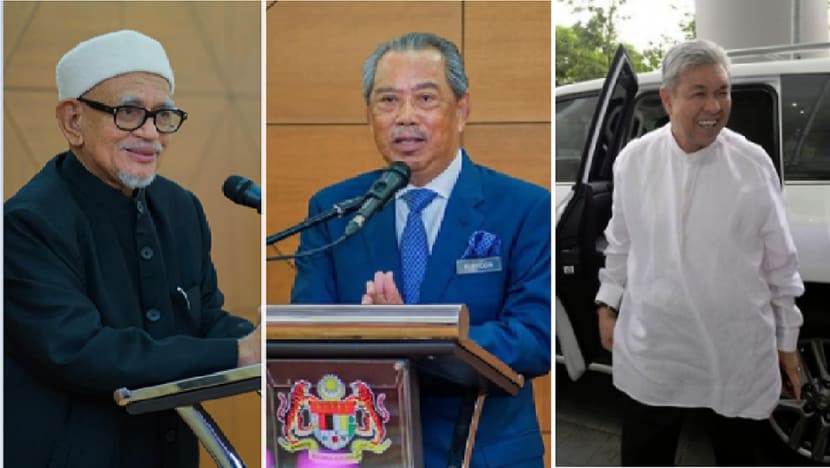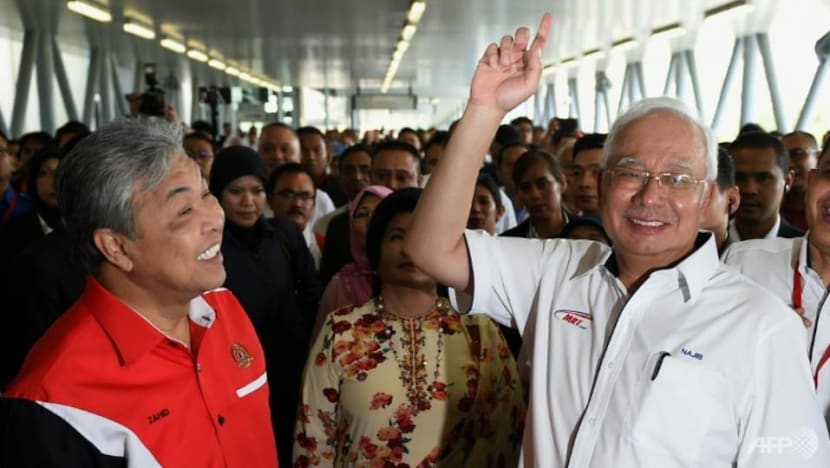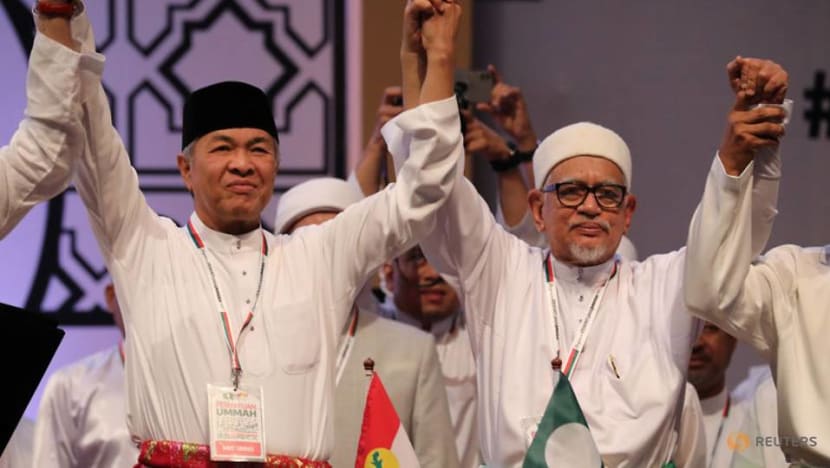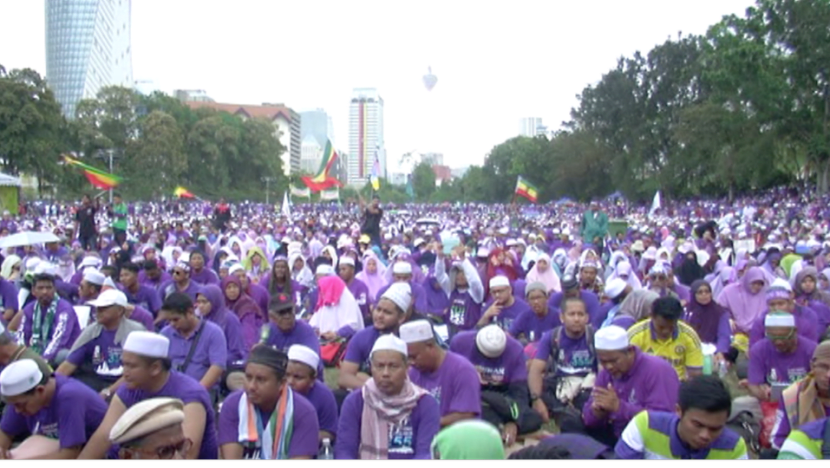commentary Commentary
Commentary: UMNO's break with Bersatu could come at a high price for Malaysia
After UMNO’s general assembly meeting, the shifting sands of coalition politics and UMNO’s polarising announcement make the road ahead rockier, says James Chin.

Composite picture of Hadi Awang, Muhyiddin Yassin and Zahid Hamidi. (Photos: Agencies)
HOBART: Last Sunday (Mar 28), UMNO did what was widely anticipated but thought impossible at its annual party assembly.
It passed a resolution calling on UMNO to face the next general election (GE) alone.
In practice, this means cutting ties with Parti Pribumi Bersatu Malaysia (Bersatu), its partner in the Perikatan Nasional (PN) government.
It was a huge victory for Zahid Hamidi, UMNO’s president and Najib Razak, the former president, who were the main agitators behind UMNO’s exit.
Without these numbers to form a parliamentary majority, Prime Minister Muhyiddin Yassin would have no choice but to call for an early GE.
To say this is awkward for Muhyiddin is an understatement. He tried hard to get his UMNO allies in the party to stop the resolution but to no avail.
The groundswell in UMNO was against Bersatu, in part because many UMNO members believe Bersatu is plotting to replace UMNO as the dominant Malay party in Malaysia.
UMNO leaders are also extremely angry Bersatu has sidelined them in government posts and government contracts. Despite being the largest party with the biggest numbers of elected MPs in March 2020, UMNO only had nine Cabinet positions and few of the plum posts.
READ: Commentary: UMNO’s fear that Bersatu could destroy it does have some basis
UMNO’S POSITION CONSOLIDATED
Muhyiddin’s gameplan to split UMNO has failed. His champion, Minister of Federal Territories Annuar Musa, who argued that UMNO should work with Bersatu, has been completely sidelined.
Annuar was labelled a “pest” and worse when Zahid challenged him on Sunday to put his money where his mouth is. Referring to Annuar, Zahid spoke of a minister who has “stabbed UMNO in the back” and said, “if he’s a man, he should resign as minister”.
Another critic, UMNO Putrajaya division deputy chief Tun Faisal Ismail, saw his membership suspended for six years for criticising Zahid openly, an unusually long period.
If anything, the general assembly has strengthened Zahid's and Najib's hands, who are now calling the shots. If Muhyiddin wishes to stay in power, he cannot bypass them anymore.

They have undermined UMNO factions sympathetic to Muhyiddin. By consolidating internally, UMNO can now make more aggressive demands of Bersatu and there is one both leaders may have in mind. Zahid and Najib have been agitating for Muhyiddin to use his influence to stop these corruption trials against UMNO leaders.
UMNO’s general assembly comes right after the High Court hearing of Zahid’s corruption charges presented by the prosecution. Zahid’s defence claimed the Malaysian Anti-Corruption Commission’s case was politically motivated. His case will see resumption of oral and written submissions in June.
Najib’s is also pending an appeal, as is another senior UMNO member, Tengku Adnan Mansor’s graft case.
READ: Commentary: UMNO president Zahid Hamidi’s many headaches
READ: Commentary: This is not the end of Najib Razak
SPOILING FOR A FIGHT
Zahid knows the timing to take the fight to Muhyiddin is right. The UMNO grassroots are all fired up and spoiling for a fight with Bersatu.
It is no accident UMNO’s Johor chief minister Hasni Mohammad, during his speech at the UMNO assembly, said Muhyiddin himself will lose if he contests the Pagoh parliamentary seat in the next GE.
“I was informed (by UMNO’s Pagoh division) support for Perikatan Nasional in Pagoh is only 19.8 per cent,” he added.
UMNO still has a formidable election machinery in the rural areas and can easily beat Bersatu’s election machinery in the Malay areas.
READ: Commentary: Johor city dwellers hit hard by MCO but rural communities fare worse
PAS, GPS AND OTHER PARTIES THE KEY BENEFICIARIES
The unintended consequence of UMNO’s break with Bersatu is the leverage other parties in the coalition have gained. It has placed PAS, with 18 parliamentary seats, in a powerful position. PAS could play kingmaker but it is likely to do nothing.

PAS has always dreamt of having power in the federal government so that it can push for more conservative Islamic laws. With inaction on the UMNO-Bersatu fallout, both are likely to accede to PAS’ demands as they try to court its support.
Another potential winner in the saga is Gabugan Parti Sarawak (GPS), PN’s Sarawak ally, which also has 18 seats. Although not part of PN, they have pledged 18 MPs to support Muhyiddin. They have publicly declared this support is tied to Muhyiddin and not to PN.
And with Muhyiddin weakened by UMNO’s planned departure, GPS can extract concessions from the prime minister. After all, the Sarawak state election is just months away and GPS needs all the resources it can get to win big.
READ: Commentary: UMNO’s in no shape to play kingmaker in Malaysia
THE GREENING OF MALAYSIA
While the press concentrated on UMNO’s impeding PN exit and the implications for party politics, a far more important announcement with larger ramifications for Malaysia’s political future from Zahid was lost in the massive media blitz.
Zahid promised that if UMNO wins a two-third majority in the next GE, UMNO will alter the Malaysian Constitution to “empower” Shariah law. While he did not provide details, his promise to elevate the powers of the Shariah Court could mean civil courts can no longer challenge key judgments of the Shariah Court.
If such efforts are pursued, the implications are enormous for a multi-religious country like Malaysia. It is unclear whether this could vest the Shariah Courts with powers over issues impacting non-Muslims, and whether non-Muslims can seek a judicial review.

One such thorny area is child custody after one spouse converts to Islam and then converts the children, leaving the non-Muslim spouse in an impossible position.
In almost all cases, the Shariah Court have ruled that the child must be raised as a Muslim and the converted spouse should therefore have custody.
A 2009 case where the Shariah court initially gave custody of three secretly converted children to their Muslim father, K Pathmanathan, spooked fears. The non-Muslim spouse could have few legal recourse if civil courts do not have jurisdiction, since non-Muslims and non-Muslim lawyers are barred from appearing in a Shariah Court.
By taking such a hardline stand, UMNO is signalling that it has decided to court conservative Muslim votes aggressively, potentially pushing PAS and Bersatu further to the right if they want to compete to represent the Malay-Muslim heartland. And all this without PAS nudging UMNO to do so.
This is a dangerous, polarising move that could galvanise non-Muslim voters behind the opposition Democratic Action Party (DAP) and Anwar Ibrahim’s Parti Keadilan Rakyat (PKR). Many non-Muslim bumiputera in East Malaysia are concerned whether this populist attempt could lead to a slippery slope that gradually imposes Islam on the country.
READ: Commentary: Why Anwar Ibrahim’s longheld dream of becoming Malaysia PM keeps getting thwarted
UMNO’S WITHDRAWAL IS NOT FINAL
But while the effect of this weekend’s general assembly is to sound the war drums and set UMNO on the path against Bersatu, you will not see UMNO ministers resigning en masse this week.
Rather, the assembly has left the timing of that move to Zahid, who has already said the earliest will be after the State of Emergency is lifted, i.e. Aug 1.
Still, UMNO’s PN withdrawal is not final. The party made it clear Zahid will be the man to decide if and when to pull the final trigger.
READ: Commentary: A convenient state of emergency amid challenging times in Malaysia
This means we should not rule out Zahid delaying the exodus and negotiating a truce with Muhyiddin to keep the government intact until the end of its mandate in 2023.
Muhyiddin’s other option is to create a new alliance to replace UMNO. The only other parties with enough MPs to replace UMNO are PKR or DAP. Both choices are extremely unpopular with ordinary Bersatu members.
Muhyiddin may even make peace with his nemesis, former Prime Minister Mahathir Mohamad, who has four MPs, after Pejuang failed to register as a political party.
Since the internal coup in February 2020 which led to the formation of the PN administration, the country has been plagued by political instability.
The road ahead only looks rockier.
Listen to Malaysians coping with a new wave of COVID-19 share their very different experiences of living through the pandemic in Johor, Kuala Lumpur and Sabah:
Professor James Chin is Professor of Asian Studies at the University of Tasmania and Senior Fellow at the Jeffrey Cheah Institute on Southeast Asia.














